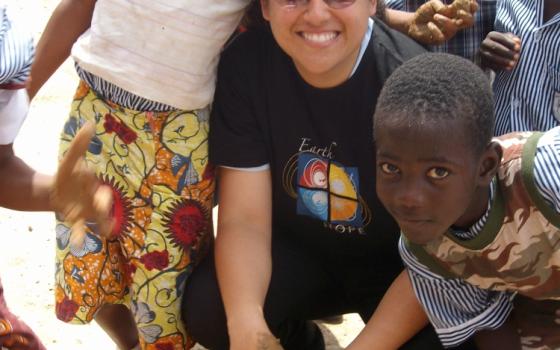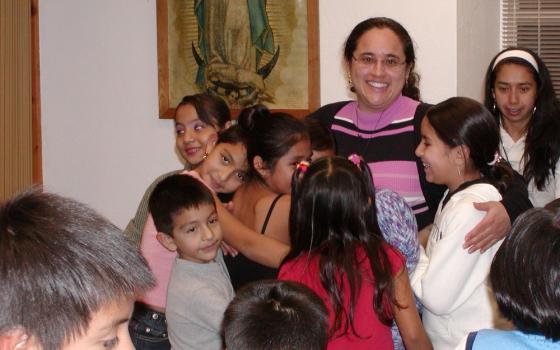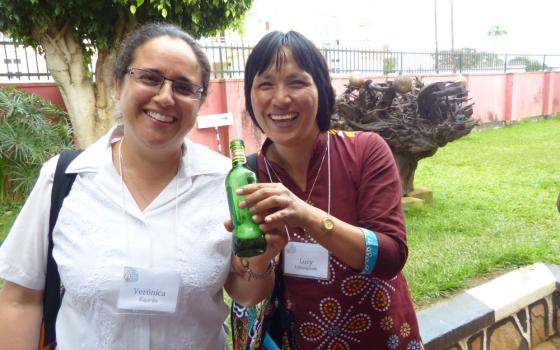You don’t have to see a picture of Holy Cross Sr. Verónica Fajardo to know what she looks like – you can hear the wide smile in her voice and in her ever-present laughter.
At age 39, she has already had what most would consider a full life: Natives of Nicaragua, her family fled the war there and came to the United States when she was 8 years old. She grew up in Los Angeles and studied education at Loyola Marymount University, getting a master’s degree in special education, which she used to teach in public schools for six years before getting involved with the Sisters of the Holy Cross and teaching in Catholic schools for five years.
After professing final vows, Fajaro went to North Carolina, where she taught for three years, then in Ghana for a year and a half. After that she went to Utah, where she became a certified legal representative, serving at Holy Cross Ministries of Utah and working with victims of domestic violence and victims of crime.
That might have been enough for many people, but now the bilingual Fajardo is back in school, working on a master’s degree in social work and public administration at the University of Southern California.
You’ve already had what sounds like a full life. What are you doing back in school, and how’s it feel to return as an older student?
I know! Isn’t it something?! I just started this fall, so it’s all still a little new, and so many things have changed. It keeps me on my toes and learning every day. How is it different? I wish I had more time to look in depth into everything. But there’s just so much, so you have to move on, move on, move on.
The Congregation of the Holy Cross has a variety of sponsored ministries, and I hope to collaborate in one of those with the social work part of it. The public administration side is because I was recommended to look into leadership. When I was in Utah working with victims of domestic violence, I explored going to law school for a while, but it just wasn’t me. I’m much more of a people person, and that was a different world.
Many would wonder what drew you to religious life, pointing out that you already had a master’s degree and a career, and would ask why you would “give that up” to become a sister. But it doesn’t appear you’ve given much up.
It’s amazing all that’s happened with my journey. But for me, religious life was really feeling a sense of a call and knowing I have a gift I can contribute in the church. Growing up, my own family was always very involved in the church and parish life, and my experience with church is that it’s always been a place of nourishment and support. In Nicaragua, you couldn’t trust the government, but you could trust the church. If you went to a church, you were safe. Then when we moved to Los Angeles, which was so diverse we were able to find a community where we fit in. It was a welcoming place, you felt at home, and because we’re Catholic, to be able to go anyplace in the world and experience our faith, it’s a blessing, and that didn’t change.
When I was in [the religious education program for children], I was thinking about being a teacher, and I began to help out, thinking it was a great way to get my feet wet and also learn more about the faith. So when I started to explore religious life, it was just a continuation of that. And when I went to a Catholic university, then more of the social justice piece was planted – so religious life wasn’t something totally out of left field for me.
Instead, the more I looked at it, it was life giving. And when I heard of the different ministries and the different work the sisters are doing, it was so motivating – it was like, ‘Yes! I love this!’
I especially loved Holy Cross because though I loved teaching, I knew I didn’t want to teach the rest of my life, and I knew they were involved in different ministries. It’s amazing that you don’t only have to respond to God by doing one thing – you can be a teacher, a lawyer – there’s so many different ways of responding to the needs of the church. That was the hook. It was also the fact that we’re an international congregation – when you leave your own home and you go someplace else and walk in someone else’s shoes, that helps you have a greater view of life and makes you stretch as a person.
So now you’re back in school. What else is happening in your life?
I have an internship for school at the Restorative Justice Center, which works primarily with youth ages 11-17 who’ve committed minor crimes. It’s a diversion program. We do extensive case management and counseling so they will not go back to whatever they were doing.
I’m also involved with a couple of committees within the congregation, including the social justice committee. This year our theme is ecological sustainability, so we’re tracking how much carbon we produce, and we’re hoping to later begin a fund to offset the amount of carbon we put out there and reduce carbon emissions. We hope to have grants that sisters can apply for projects like planting trees, installing solar panels or planting vegetable gardens.
The other thing we’re doing is to look at how we as a congregation can help victims of human trafficking. We’re also working with other congregations and investing with companies where we can put pressure on them to improve their practices. For example, in Ghana, children are being used to pick cocoa beans. But if we’re shareholders in Hershey, we have the legal right to speak up and pressure them to ensure child labor isn’t used in the cocoa beans they buy.
I’m also on the Hispanic ministry committee, and we’re working on immigration issues, especially unaccompanied minors crossing the border. In July, we went to a conference where we were lobbying the representatives from Utah on the issue, and they were not kind or nice to the sisters. They were like, ‘If you don’t have the answers, what are you doing here?’ It wasn’t pretty. It’s like, ‘Oh, you nuns – you’re a bunch of trouble makers!’ But we know going in we’re not going to be welcome, that you’re going to be saying things people don’t want to hear.
And yet you laugh all the time. I can hear the smile in your voice.
You have to have a good sense of humor. God is good, and there’s a lot of good people in the world. It’s always nice to celebrate life.
[Dan Stockman is national correspondent for Global Sisters Report. Follow him on Twitter or on Facebook.]



